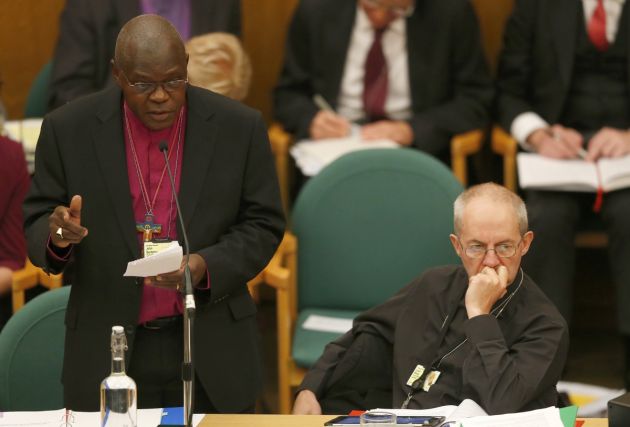Church of England proposes 'blessings' for gay marriage

LONDON (Reuters) - Church of England clergy would be able to "bless" same-sex relationships under long-awaited proposals unveiled as the church adopts a more open - but disputed - approach to homosexuality.
Although gay couples would still not be able to legally marry in a church, the proposed change announced Thursday would officially sanction clergy to let gay and lesbian couples mark and celebrate same-sex marriages and civil partnerships in a church service.
Critics swiftly condemned the "blessing" proposal as contrary to the church's teaching on sexual conduct.
The proposal was among 18 recommendations put forward by a working group set up two years ago amid growing tension over the church's approach to gay worshippers and clergy but could take up to two years of discussions before becoming policy.
Acknowledging the issue was divisive, group chairman Joseph Pilling said the church needed to reflect rapid changes in society as senior clergy express fears of a looming crisis, with falling attendance rates and failure to attract young people.
This year, parliament introduced new laws to allow gay marriages from 2014 after legalising civil partnerships in 2005 and the church dropped its ban on gay clergy in civil partnerships becoming bishops.
"You can make a church a cold place for gay and lesbian people ... or you can make it a more warm and accepting place," Pilling told a news conference.
"No member of the clergy, or parish, would be required to offer such services and it could not extend to solemnising same sex marriages without major changes to the law."
RELAXED ATTITUDE
Pilling said the group also suggested that the Church of England, mother church of the world's 80 million Anglicans, should address the issue of same-sex relationships with the wider Anglican community and other churches.
Critics said the proposed "blessing" ran counter to church teaching, which says couples can only have sex within marriage and that marriage can only be between a man and a woman.
The one dissenting voice on the seven-strong committee, the Bishop of Birkenhead Keith Sinclair, said he did not believe the report offered a consistent or coherent response to questions of the church's response to sexuality.
Andrea Williams, founder of Christian Concern, which backs traditional marriage, and also a member of the Church of England governing body, the General Synod, said the proposed "blessing" would sow division and acrimony within the Church of England.
"The majority of Christians throughout the world and throughout history are committed to orthodox biblical teaching on marriage and sexuality," she said in a statement.
The spiritual head of the Church of England, Archbishop of Canterbury Justin Welby, earlier this year reiterated his opposition to gay marriage, but also acknowledged there had been a "revolution" in attitudes towards homosexuality and that the church's stand could be seen as out-of-step with public opinion.
A national survey on sexual attitudes released this week showed that most Britons have a far more relaxed attitude towards same-sex relationships than in previous decades.
In 1990, fewer than one in four men aged 16 to 44 were tolerant of same-sex relationships but that figure was now nearly half and in women, the number jumped to 66 percent from 28 percent in 1990-91.
(Reporting by Belinda Goldsmith; Editing by Gareth Jones)